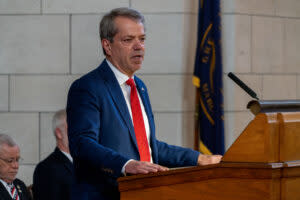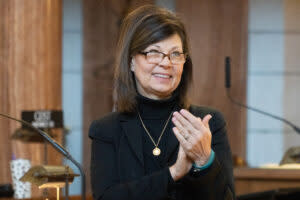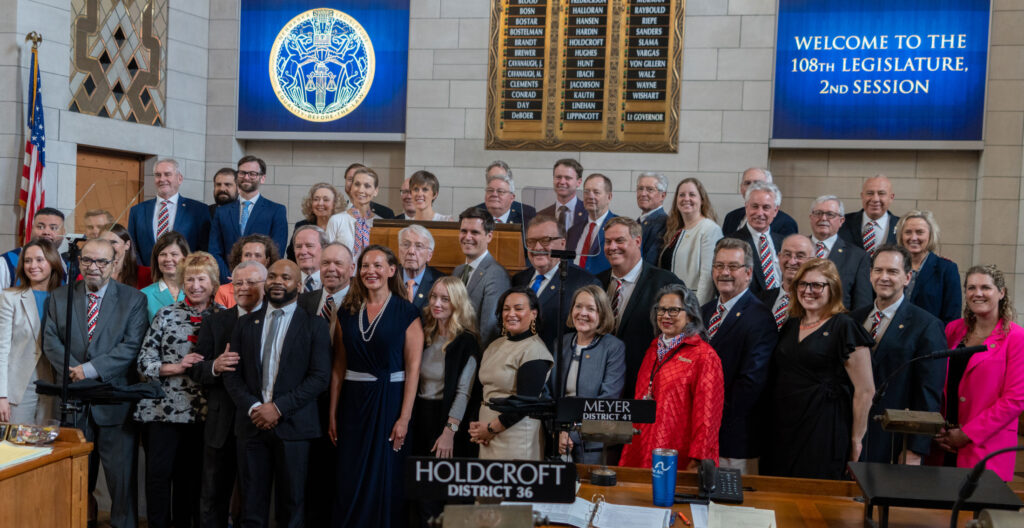Lawmakers gather on the last day of the 2024 legislative session, though many expect to return for a special session later this year. Not pictured: State Sens. Joni Albrecht, Ben Hansen, John Lowe and Tony Vargas. April 18, 2024. (Zach Wendling/Nebraska Examiner)
LINCOLN — Lawmakers are gearing up for a special session later this year but on Thursday they celebrated the end of a session in which they “successfully hit the reset button,” according to Nebraska’s top legislative leader.

Speaker John Arch of La Vista. April 18, 2024. (Zach Wendling/Nebraska Examiner)
Speaker John Arch of La Vista said the Legislature sent more than 370 bills to Gov. Jim Pillen this year, including “good government policies” to grow Nebraska’s workforce, economy and communities; support families and K-12 education; reform the criminal justice system; and improve Nebraskans’ physical and mental well-being.
It’s a session, Arch said, “we can all be proud of.”
‘Enjoy halftime’
Pillen similarly applauded lawmakers for approving a health care proposal that could bring about $1.4 billion to Nebraska hospitals as well as enhancing child care options, creating incentives for businesses to attract out-of-state workers and authorizing small school districts to better protect students “by training good guys with guns to stop bad guys with guns.”
“Even in a short session, your hard work and countless hours yielded tremendous results for Nebraska,” Pillen told lawmakers.
Much of Pillen’s speech to the full Legislature, however, focused on what he described as late-stage failures in declining to take a final vote on property tax relief. He said senators offered “not a penny” more of relief; the bill was pulled from the floor earlier in the day after it appeared to be in jeopardy of failing.


Nebraska Gov. Jim Pillen. April 18, 2024. (Zach Wendling/Nebraska Examiner)
The governor sought to reduce property taxes by 40% this year, and he said that’s still the goal, vowing to call “as many sessions as it takes” to get tax relief in 2024.
“We’re behind at the end of the first half, but we still got a second half to go,” Pillen said. “Enjoy halftime. We’ll see you again here soon.”
Pillen also said that he will not hesitate to call a different special session for “other unfinished business,” which he said includes switching Nebraska’s allocation of Electoral College votes to a winner-take-all system. He has said he’ll only call a session for that if there are sufficient votes — there currently aren’t 33 senators backing the change.
Special session within sight
State Sen. Lou Ann Linehan of Elkhorn, chair of the Legislature’s Revenue Committee, pulled her tax proposal after it appeared to be in jeopardy Thursday. She said Pillen “gave all kinds of warnings” of a special session, and she wasn’t surprised by his speech.
“I’ve already told the Revenue Committee that we’re going to be working this summer,” she said.
State Sen. Teresa Ibach of Sumner described Pillen’s speech as “thoughtful, yet deliberate” and said while there is a “ways to go” on many issues, the trajectory is good.


State Sen. Teresa Ibach of Sumner. March 3, 2023. (Zach Wendling/Nebraska News Service)
“At the end of the day, we all have the best interest of what we’re trying to accomplish here at heart. I think taking a very thoughtful (approach) and navigating things a little bit will end up being very productive,” Ibach said. “I’m actually looking really forward to it.”
Special sessions come at their own expense, at a cost of thousands per day.
Pillen’s speech did not face the same positive reception from others, such as State Sens. Danielle Conrad of Lincoln and Megan Hunt of Omaha, who criticized Pillen for focusing on what they said were his losses rather than legislative accomplishments.
“If he has ideas for new solutions to achieve our shared goals of growing Nebraska’s workforce and making this a great place for every Nebraskan to call home, then I’m eager to work with him on that for the special session,” Hunt told the Nebraska Examiner.
Conrad said senators are unafraid to return for a special session and “shouldn’t wait around.”
“We should roll up our sleeves, put all ideas and solutions on the table and find the right path forward to fund our schools and deliver property tax relief without raising taxes on Nebraska families and businesses,” Conrad said in a text. “I’m confident we can do it together.”
2023 proved to be ‘an aberration’
Legislative leaders strove to make this year’s 60-day session different from the 88-day session in 2023, which was largely defined by legislative gridlock, infighting and rancor.
Arch, in closing remarks last year, said that he hoped 2023 “would be an aberration, not a predictor of the future,” and that lawmakers had to decide for themselves how they would move forward.


Lawmakers who are term limited or not seeking election in the fall meet together on the last day of the 2024 legislative session. Not pictured: State Sens. Joni Albrecht, John Lowe and Tony Vargas. April 18, 2024. (Zach Wendling/Nebraska Examiner)
He said lawmakers were motivated to find a different way to legislate and they heeded his call, taking months of reflection before returning in January. This included implementing feedback to better improve the public input process for Nebraska’s “second house.”
But one message still holds true: how “extremely fragile” Nebraska’s one-of-a-kind, one-house political system is.
At least 15 senators will not return next year, 13 due to constitutional term limits, and Arch said those returning must carry forward what they learned this year and be good role models for those who come next.
“We must continue to protect this treasured institution of the Unicameral,” Arch said.
By the numbers: The 2023 and 2024 legislative sessions
In 2024, each of Nebraska’s 49 lawmakers had a bill make it to the governor’s desk, whether on its own or after being folded into various legislative packages.
Senators sent 11 final bills to the governor Thursday, including Legislative Bill 25, from State Sen. Justin Wayne of Omaha, which would expand legal liability in certain cases of child sexual assault and child abuse. Wayne said it faces a possible veto, which Pillen would need to exercise by next Wednesday.
Here’s a statistical comparison between the 2023 and 2024 legislative sessions.
2023 statistics — 88 days in session
-
820 bills introduced, or an average 16 per senator.
-
1,160 motions were filed, with the vast majority (80%) coming from a trio of lawmakers: State Sens. Machaela Cavanaugh of Omaha (437), Megan Hunt of Omaha (359) and Danielle Conrad of Lincoln (128). State Sen. Julie Slama of Dunbar followed with 41 motions.
-
Top bill targeted: LB 574, restricting gender care for minors and abortion at 12 weeks gestation age (42 motions).
-
Top senator targeted: State Sen. Lou Ann Linehan of Elkhorn (78 motions).
-
57 bills were forced to maximum debate. Only one failed, on abortion restrictions.
-
52 bills approved by the Legislature and governor — 33 laws and 19 appropriations.
2024 statistics — 60 days in session
-
597 bills introduced, or an average 12 per senator.
-
258 motions were filed, with the majority (47%) from Cavanaugh (121). Linehan followed with 20 motions.
-
Top bill targeted: LB 937, authorizing certain tax credits and exemptions (19 motions)
-
Top senator targeted: Linehan (36 motions).
-
11 bills were forced to maximum debate. Of those, four failed: two-person train crews, a slimmed-down Residential Tenant Clean Slate Act, criminal obscenity in K-12 schools and sex-based restrictions for K-12 bathroom and sporting teams.
-
201 bills were approved — 153 laws and 48 appropriations. One was vetoed, two became law without the governor’s signature and 11 are pending approval.
By Nebraska Examiner reporter Zach Wendling
GET THE MORNING HEADLINES DELIVERED TO YOUR INBOX
The post Nebraska lawmakers adjourn, but break will be short-lived as special session looms this summer appeared first on Nebraska Examiner.
